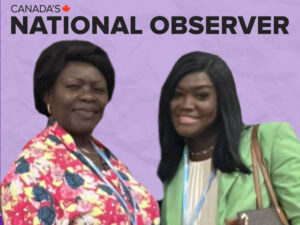Human rights ombudsperson will bring long-awaited accountability to Canadian mining

The government has an opportunity to entrust the ombudsperson with the responsibility to ensure that the rights of women and girls are respected, that resource extraction does not result in increased gender-based violence, and that the unique perspective and concerns of women are taken into account when resource extraction projects are being considered.
Nenita Andes Condez risked her life to visit Canada last spring. She was part of a KAIROS tour of Philippine leaders seeking accountability for mining operations from Canadians and government officials. Nenita is an Indigenous Subanen leader from the Philippine island of Mindanao. She advocates for her people in the face of complaints of human rights violations and ecological damage caused by the actions of Canadian mining companies.
Nenita says she lives under constant threat of assassination and is currently unable to return to her village.
Nenita’s account of dispossession and threat of violence is not isolated, or even rare. It is the testimony of many people we have met through our global partners. We have heard accusations of intimidation, threats, and harassment, kidnapping, illegal detention, torture, displacement, loss of livelihood, sexual violence, and even murder at the hands of security, military and para-military forces that serve the overseas operations of some Canadian mining companies and their subsidiaries. Ecological degradation such as contaminated water is another common complaint.
This is why the recent government announcement on the appointment of the Canadian ombudsperson for responsible business enterprise is encouraging. For a decade, civil society organizations, faith groups, and labour unions have been calling for effective corporate accountability, including an independent human rights ombudsperson with the power to investigate. Special rapporteurs, committees, and United Nations working groups have joined this call.
Not all mining companies are culpable, but this lack of accountability has cast a long shadow on the entire sector, and on Canada. The ombudsperson announcement is long overdue.
While the government has yet to specify the details, it is encouraging that the ombudsperson will have the power to investigate complaints, issue public findings regarding allegations of harm, and make recommendations for redress, including corporate eligibility for government services. In order to be credible and effective, the office must also be fully independent with the power to compel documents from mining companies accused of abuses.
Plaintiffs who claim harm against Canadian mining operations often have no hope of gaining justice because their domestic legal systems can be corrupt or inaccessible. And, despite recent breakthroughs in cases accessing Canadian courts such as the Nevsun Resources and Tahoe Resources Inc. cases, there’s always a chance the Canadian courts will turn them away claiming that the cases lack jurisdiction in this country.
Over the years, members of the international church community have asked KAIROS representatives who travel to the global south tough questions about what Canadian churches are doing to call to account the actions of Canadian mining companies.
These international church members see gaping discrepancies between Canadian rhetoric around human rights and the actions of companies which benefit from the financial and diplomatic support of the Canadian government. They see first-hand the ecological, social, and health impacts of these mining operations with minimal economic benefit to local communities and increases in conflict and risk. They also see the formidable barriers in seeking justice.
There is also increasing evidence and growing concern about the harmful impacts of resource extraction on women, as highlighted in a 2016 report by the United Nations’ Convention on the Elimination of All Forms of Discrimination Against Women Canadian ombudsperson for responsible business enterprise.
Women often acutely feel the negative social, ecological, and economic impacts associated with mining, including increases in sexual violence. They also play a critical role in defending collective rights and the environment. Their perspective is too often ignored.
In November, the Canadian government launched its Feminist International Assistance Policy, prioritizing gender equality and the protection of the rights of women and children in its foreign policy.
With this priority in mind, the government has an opportunity to entrust the ombudsperson with the responsibility to ensure that the rights of women and girls are respected, that resource extraction does not result in increased gender-based violence, and that the unique perspective and concerns of women are taken into account when resource extraction projects are being considered.
Far too often we have been asked “when will Canada take responsibility for the abuses caused by the overseas operations of Canadian mining?” Today, we can tell Nenita and so many others that they will be heard. Finally, there is hope.
Originally published in the Hill Times, on February 14, 2018.
Jennifer Henry is the executive director of KAIROS Canada.







